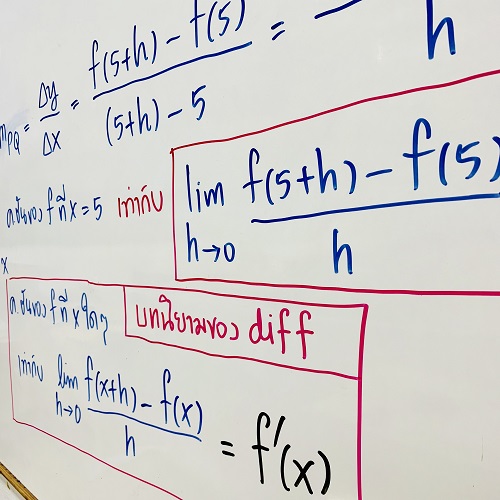The field of applied mathematics is one of the highest-paying bachelor’s degrees. If you choose this major, you know you’re getting into a lot of high-level math classes. What you may not know is what to expect during your first year of college. Although applied mathematics majors will jump into math coursework from their very first semester, you won’t get into any math classes that are too crazy this early. Often, the math courses you take in your first year of undergraduate studies help you build a strong foundation in college-level math. In later years of study, students of applied mathematics build on this background as they take increasingly complex upper-division mathematics coursework and classes in engineering, the application of science and math principles to real-world situations.
How Much Math Is in the First Semester?
IMAGE SOURCE: Pixabay, public domain
Most undergraduate applied math majors kick off their college curriculum with a Calculus I course. One reason your first college calculus course appears so early in your degree plan is because you will likely take a sequence of at least three regular college-level calculus classes during the course of your studies, so you need to get started on this course sequence early. Because a good chunk of your major coursework will build on the foundations of calculus you cover in this course sequence, you have to knock out these requirements before you move on to more advanced math coursework. In this first calculus class, you will likely cover finding derivatives and integrals of functions.
Some undergraduate applied math programs use the first semester of students’ freshman year to introduce them to mathematics as a profession. A course like this is not a math course per se, but instead, a professional development course tailored to students of applied mathematics. This class may, however, cover the ways in which math professionals apply mathematics in fields like finance, engineering, computer science and physics.
An introduction to applied math professions course may also emphasize the development of skills outside the usual realm of mathematics, such as the teamwork skills you will use in a career collaborating with other professionals.
What to Expect for the Second Semester
It should come as little surprise that your second semester will also have math courses, a trend that will continue throughout your academic career. By their second semester, applied math students are expected to have passed Calculus I and be moving on to Calculus II. This class builds upon and expands upon what students learned in their previous calculus class and sets up for their more advanced math courses in the later semesters. Some Calculus II courses contain a laboratory component, but not all do.
Other second-semester courses may also test your math skills. You may take your first foray into the field of discrete mathematics this early. You will also find quite a bit of math in some of your classes that are offered outside the mathematics department, like a laboratory physics course or a computer science course. Physics is seen to be the more math-based of the sciences, so it shouldn’t be a surprise that it is a required science for applied mathematics majors. Depending on the requirements of your specific school and degree program and your own interests, this may be your only required physics course or the first of several classes in this branch of science. You might also start taking technical elective courses during this semester.
If it seems like your curriculum is a little light on math courses for a math major, don’t worry. Your sophomore, junior, and senior years will have many more math courses. As you work your way through the curriculum, your math studies will become more complex.
What Else You’ll Study in Your Freshman Year as a Math Major
If you’re only taking a few math classes in your first year of studying applied mathematics, you might wonder what other subjects of study will make up your freshman curriculum. The first year of college typically involves a lot of general education classes for students. General education coursework is usually a college-wide requirement, with students of all majors taking mandatory coursework in disciplines outside their chosen field of study.
Some of the classes that are relevant to your major also fulfill general education requirements. That first calculus class will usually satisfy a general education mathematics course requirement, and a class in physics may be enough to meet your laboratory science requirement. However, you should also be prepared to take classes that are outside of your comfort zone, including communications and composition, the social sciences and the humanities.
Many math students wonder why they must take non-technical general education classes when they’re planning for a technical, math-heavy career. Studying topics like history, social sciences and the liberal arts helps develop crucial thinking and communication skills.
Related Resources:
What is the Benefit of a Mathematics Degree vs a Statistics Degree?
What are the Easiest Degrees to Get in Mathematics?
What Can I Do With a Degree in Mathematics?
For Further Reading:

